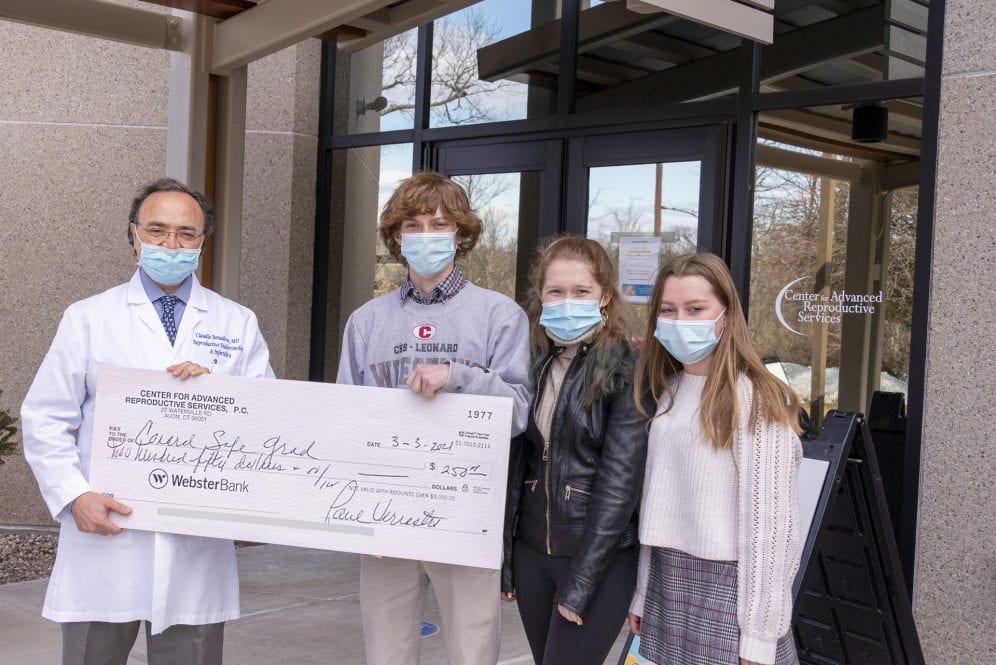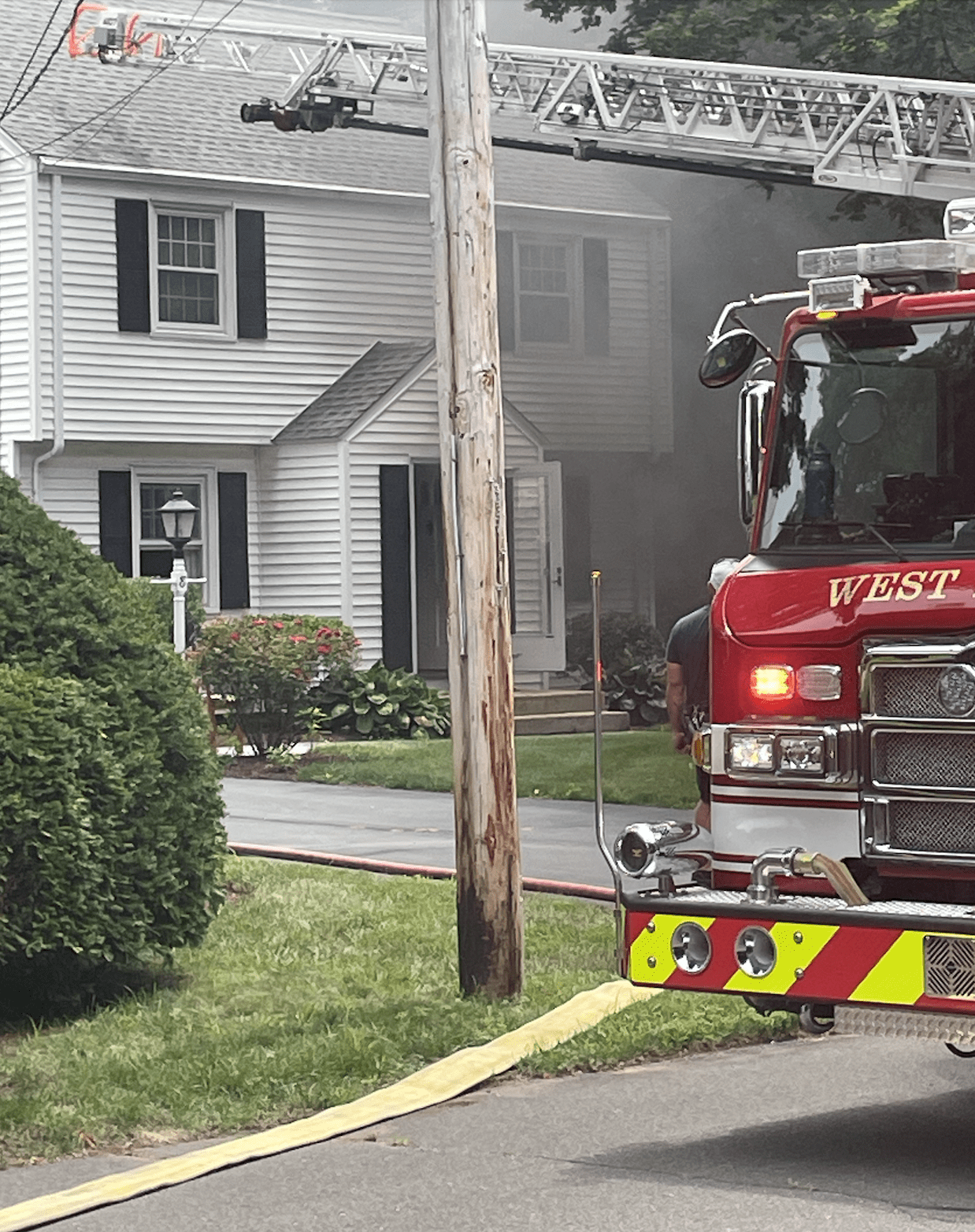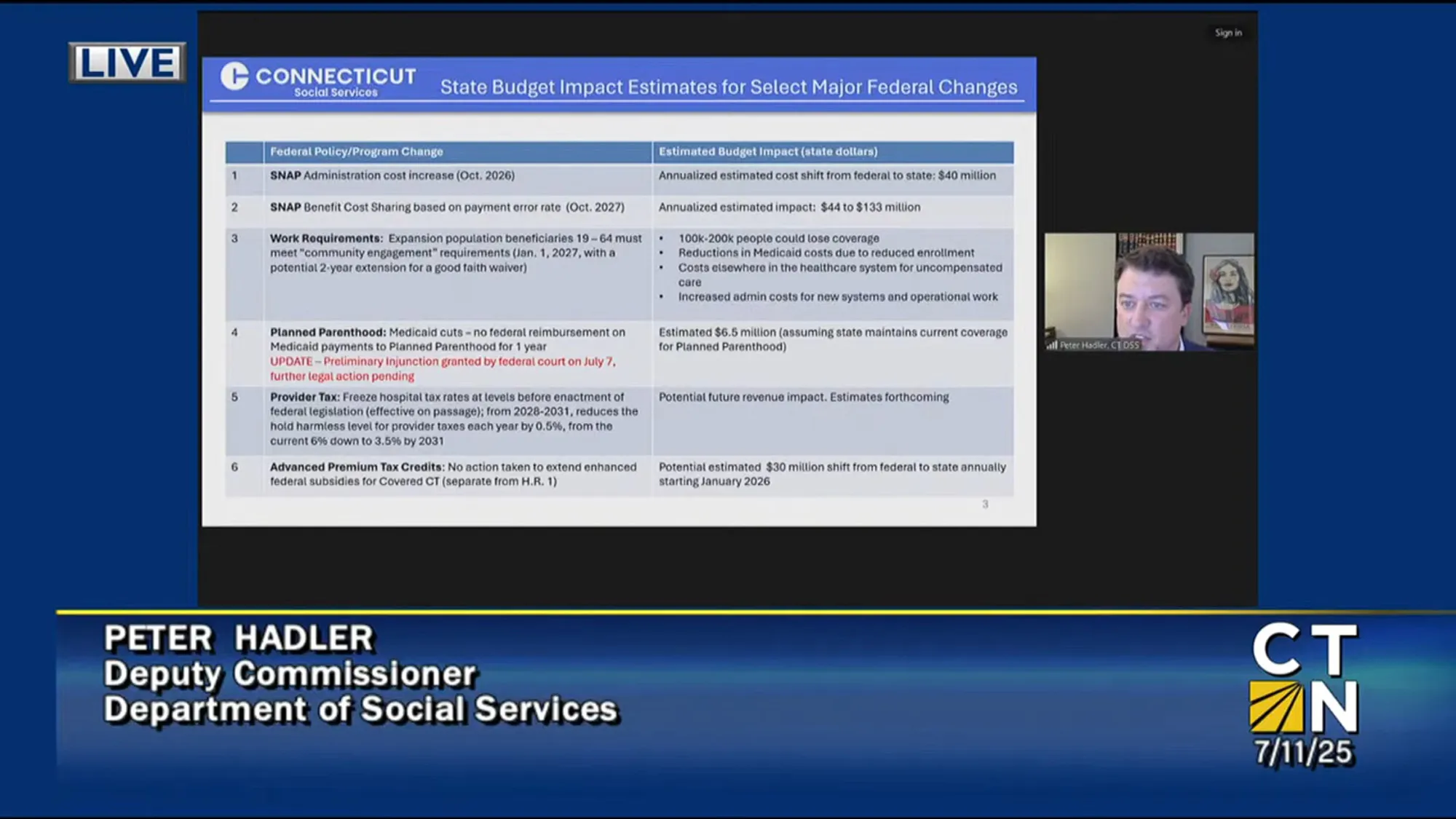Conard Safe Grad Receives Donation in Honor of Triplets Born at UConn, Now High School Seniors

Audio By Carbonatix

Dr. Claudio Benadiva from the Center for Advanced Reproductive Services with triplets George, Maggie, and Barbara Leonard on March 4, 2021. (Tina Encarnacion/UConn Health photo)
West Hartford resident Regina Leonard underwent In Vitro Fertilization at the Center for Reproductive Services which resulted in a beautiful set of triplets, born at UConn Health, who are now graduating from high school. Over a decade of advancements has changed IVF which may make the birth of triplets scarce.
By Jennifer Walker, UConn Health
When Regina Leonard was struggling to conceive she took the recommendation of two co-workers to see Dr. Claudio Benadiva, director at the Center for Reproductive Services (CARS) affiliated with the UConn School of Medicine.
Leonard went through two rounds of In Vitro Fertilization (IVF), a procedure where mature eggs are retrieved and exposed to sperm to create embryos that are then transferred back into the uterus. Her first two rounds were unsuccessful, but her third-round resulted in a multi gestational pregnancy of triplets.
In the early years of in vitro fertilization, overall pregnancy rates were low, and it was considered necessary to transfer more than one embryo to increase the chances of pregnancy. Consequently, IVF carried a high risk of multiple pregnancies and its associated adverse effects on mothers and children.
However, with advances in assisted reproductive technologies resulting in increased pregnancy rates the concept of transferring just one embryo was considered possible.
According to Benadiva, triplets are very rare now due to developments in embryo culture and grading in the IVF laboratory allowing for only one embryo to be implanted and a very high success rate of pregnancy.
Multiple births carry a number of risks for the mother and babies, including prematurity, low birth rate, learning disabilities, and developmental problems for the infants, and high blood pressure, gestational diabetes, and cesarean section for the mothers. And of course, this also increases the costs for the delivery and subsequent hospital stay.
Today, with better techniques for growing and selecting the best quality embryos, transferring one embryo instead of two or more to minimize the risk of multiple births is a viable option for some infertile women undergoing IVF without compromising their chance of a successful pregnancy. In fact, the results at CARS have shown that pregnancy rates are as good as those resulting from transferring more embryos.
CARS is a leader in its utilization of single embryo transfer, committed to maximizing patients’ success with a few embryos transferred as possible. According to Dr. Benadiva last year there were no triplets conceived at CARS and a lower incidence of twins. The chance of a single embryo dividing and resulting in identical twins is higher after IVF than after natural conception. So it is possible to end up with identical twins from a single transferred embryo.
Luckily for Leonard, her pregnancy which was monitored by her OB/GYN was pretty uneventful. She remembers one of her ultrasounds took two hours and Regina was so impressed with Dr. Winston Campbell who completed the procedure.
“In pregnancies of multiples such as this there are many measurements to take and can often take a long time,” says Dr. Winston Campbell, program director for the Maternal-Fetal Medicine fellowship at UConn Health.
At 32 weeks during a regular appointment, her doctor recognized that she was developing preeclampsia, a complication in multiple births. Preeclampsia is a pregnancy complication characterized by high blood pressure and signs of damage to another organ system, most often the liver and kidneys.
Leonard was sent to UConn John Dempsey Hospital’s (JDH) labor and delivery department and the triplets, Barbara, George, and Margaret “Maggie” were born at 32 weeks. The triplets were sent to the Neo-Natal Intensive Care Unit (NICU) where they were monitored. The smallest triplet was 2 lbs. 14 oz. and the largest was 3 lbs. 1 oz.
The Connecticut Children’s NICU at UConn Health provides comprehensive care of sick newborn infants using a multidisciplinary team approach. Experienced nurses, respiratory therapists, neonatal nurse practitioners/physician assistants and pediatric residents provide round-the-clock care under the close supervision of board-certified/qualified neonatologists.
“We are really blessed that it all worked out the way it did, it was a very high-risk pregnancy,” says Leonard. “The staff in the NICU was amazing and we bonded with them and the other families there.”
Maggie was the first baby to go home after about four days in the NICU, George followed two days after and Barbara came home at two weeks.
“They were really the easiest babies because the NICU had done such a good job of getting them on schedule and we kept them on that same schedule,” says Leonard.
The Leonard’s were blessed in their multi gestational pregnancy that all remained healthy throughout. The triplets have grown into healthy, active, and smart teenagers who are preparing to graduate from Conard high school in West Hartford this spring and preparing for their endeavors at their respective colleges next year.
For the triplets, as with most teenagers, the last year with COVID restrictions has been tough. Many milestones of their junior and senior years have been canceled, but they are looking forward to Safe Grad Night after their graduation. Conard Safe Grad night is an all-night, drug and alcohol-free, post-graduation celebration that will bring seniors together for one last memorable event at Conard High School. The evening is funded by parents, community members, and local businesses and cannot take place without their active participation.
“It’s been a hard year for everyone, not to mention those who have lost family and friends, so to be able to come together as a school, as a family, to close out the year, would mean a lot to everyone,” says George.
Benadiva recently presented the triples with a $250 donation on behalf of CARS to help make the Safe Grad night possible. Others interested in supporting the event can visit their website.
“The opportunity to support the Conard Safe Grad Night is a thrill for us. Being part of celebrating the high school experience of these 3 bright, young people brings our family-building journey with this family full circle,” says Paul Verrastro, CEO, CARS.
“The whole team at CARs and UConn Health make families complete and whole,” says Leonard.
Like what you see here? Click here to subscribe to We-Ha’s newsletter so you’ll always be in the know about what’s happening in West Hartford! Click the blue button below to become a supporter of We-Ha.com and our efforts to continue producing quality journalism.



